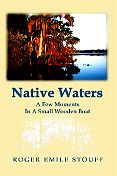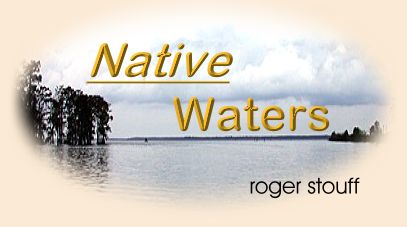|
It was cool out. A small front had moved through and
squashed the mercury down into the low fifties. A light
northerly wind would, I knew, also push some water out
of the lakes into the bayous and eventually to the Gulf
of Mexico.
So reluctant to take my big, ugly fiberglass boat into
the shallows, I retrieved my father's forty-three year-old
wooden bateau from it's safe haven under cover. After a
good cleaning I put it over into Bayou Teche at the Rez
boat landing and we were off.
Dawn was barely peeking over the trees, and I relished
the smooth acceleration, the gentle restfulness of the
little wooden bateau, as al-ways. We spirited down Bayou
Teche and into the canal linking the bayou with Lake Fausse
Point and the cove nearby I love most.
Last time I passed this way, water black as midnight
reeked of storm surges, saltwater and death. Now the
water was largely copper-brown-black, but healthier.
Still, I would suddenly pass through pockets of dead
black water and the smell would assail me. I don't know
if it is a matter of buoyancy, but it always seems the
little boat carried me just a little quicker, as if
trying to get out and away from those pools of dank
stagnation.
We made a wide turn near the locks at the Atchafalaya
Basin Protection Levee, the preemi-nent earthworks of
the twentieth century in-habitants of these waters.
While my father's people built great monuments to the
Creator at Grand Village, and stepped pyramids along
the coast, effigy mounds in the shape of thunder-birds
with outstretched wings, the marauding herds of hydrologists
and civil engineers that followed left behind levees and
locks. Indicative of a vast difference in cultural paradigms,
my father's people made peace with the water around us,
their successors struggle in vain to subdue it.
Passing through pockets of dead water now and then
under skies just being lit by an as yet unseen sun
felt like journeying between nether-worlds, but at
last I reached the cove and turned the bow to it. The
little boat, no more than twelve-feet long and narrow,
arced across the water like a bird, winged, outstretched.
True to the designs and inspirations of its builder, it
flawlessly and devotedly returned to the cove yet again.
I wish I knew how many of these journeys to the cove it
had made. I am sure it numbers in the hundreds.
That north wind was picking up again and I believed I
would be safer in the back of Sawmill Bayou, so I pointed
the bow to the northwest corner of the cove, careful to
avoid the sunken row of pilings I knew were there. My
father warned me about them each and every time I said
I was going to the cove.
"Watch out for that row of pilings from Saw-mill Bayou
to the other side of the cove," he'd say, every single
time without fail. "That'll put a hole in the bottom of
your boat."
One weekend evening he came limping home, paddling up
Bayou Teche to pull the boat home on the trailer. The
engine hung there on the transom but with no lower unit.
"What happened, pop?" I asked, incredulous with dismay.
"Hit one of them damn pilings back of the cove," he
grumbled and refused to discuss it ever again.
There was calm water in Sawmill Bayou, and I lowered
the electric trolling motor into copper-black water,
but when I touched the switch noth-ing happened. I
spent ten minutes fiddling with it and gave up,
resorting to my paddle.
A leggy Accardo Ligon Bream Killer was my choice: Good
visibility, slow, tempting sink and light enough to
throw on a long leader with my little rod. Now and then
a whiff of deadness carried over me by the slight breeze
there in the back of the bayou, from some trapped
stagnation in the swamp. I fished carefully, paddled
when I needed to, and wished desperately for rain.
Shot-gun blasts not far away reminded me that squirrel
season had started.
I noticed downed trees across one fork of Saw-mill Bayou,
hoped spring rises would wash them clear; also Susan's Bayou
was blocked by a fall that was, remarkably, still green and
lush. The Bream Killer worked hard for me, in dappled sunlight
and in shade, but I noticed that even considering the low
water levels overall, there was far less water under my paddle
than before Katrina and Rita. This cove faces northeast, and
I knew the counter-clockwise fury of the storm's winds had
pushed tons of sediment and muck into the back of the cove
where it had no way of flowing back out.
My arm ached from paddling. I grinned and cursed myself
for getting too soft, too accustomed to electric trolling
motors. My father paddled this little boat all over the
lake with his right hand, casting with his left, from
dawn to dusk, while I enjoyed the ride from the time I
was old enough to sit upright and hold a rod. I knew my
father was feeling his age when he bought his first
electric trolling motor. He was quite a bit older than
I am now, though.
The Bream Killer dropped without fanfare into a shadow
jutting out from the base of a big cypress tree, cast
by a huge limb not far off the surface. I saw it settle
in slowly, those long white legs undulating upward nicely
until it faded into the copper-black and beyond my vision.
But then the tip of the line moved upstream and without
thinking I lifted the rod tip.
The line moved upstream more quickly then, and the weight
of a respectable fish was more like a treasure to me than
any gold or silver. Catfish? Bowfin? No, for when he came
out of the water and danced on his tail, the green and
white of him was that spectacular and familiar reassurance
of a largemouth.
Soon I took him to hand, and yeah, I admit it, I kissed
him on the nose. Two hurricanes had passed, missing us
with their full impact but their outer intense bands had
both churned and blasted us. Two weeks before I had found
nothing but deadness here, stagnation and stink. Yeah, I
kissed him on the nose, and lemme tell you, brothers and
sisters, I ain't ashamed of it at all.
I didn't kiss the four redears I caught after that before
the wind picked up too much and I retired for the morning,
but I felt like it. My little lake and cove are coming back
to life. It was all I could have asked for, all I could
have wanted, right then and right there.
I cranked up the engine as the cove was getting rough from
the wind but I took a leisurely trip out to the canal that
led home. Now and then black water would be foaming and
reeking as I passed through it, but I knew the lake was
purging itself, slowly, unflinchingly.
And I thought about circles, not for the first time and
surely not the last. How I have always believed my father's
people, those who didn't fight the water but lived with and
within it, existed in circular time, time with no beginning,
no end, no middle and no apex. I think that those who came
later, those who built levees and locks and dams live in
linear time, time which has finality, has an ending and a
closure.
At what might otherwise be the end of all things, I know
that instead everything comes back to where it began. At
least for me, and for mine. Back to this little wooden boat
and this wonderful old cove of cypress trees, sunken pilings
and the way of memory. Back, at least, to when there were no
levees, no dams and no locks. There may come a day when it
can hold no more sediment, no more mud, no thick sludge and
dry out under the sun, become a marsh then a prairie maybe
even a forest in time. I'll be long gone by then, singing
with my father at the feet of our grandfathers.
That's all in a time to come. For now, at least, there is
still life here, precious and rare, and within the confines
of a small wooden boat, enough belief to keep it all in
existence perhaps just a little while longer. ~ Roger
 It's out! And available now! You can be one of the
first to own a copy of Roger's book. Native Waters: A
Few Moments in a Small Wooden Boat
It's out! And available now! You can be one of the
first to own a copy of Roger's book. Native Waters: A
Few Moments in a Small Wooden Boat
Order it now from
www.iuniverse.com, Amazon.com,
or Barnes & Noble.com.
Roger will also be giving away three autographed copies to
readers. Stay tuned, for an announcement on the Bulletin
Board on that soon.
|


 It's out! And available now! You can be one of the
first to own a copy of Roger's book. Native Waters: A
Few Moments in a Small Wooden Boat
It's out! And available now! You can be one of the
first to own a copy of Roger's book. Native Waters: A
Few Moments in a Small Wooden Boat